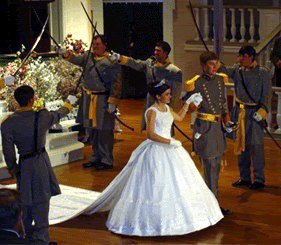 Here at Confederate Colonel, we uphold the culture of the Old South as our ideal. We draw on the lives of men like Robert E. Lee and Thomas “Stonewall” Jackson to understand what that culture was like. We look at contemporary writing, at the art and the architecture, at the politics, and at whatever else we can find to learn about that culture. In the end though, we are left with our own individual interpretation of the culture of the Old South.
Here at Confederate Colonel, we uphold the culture of the Old South as our ideal. We draw on the lives of men like Robert E. Lee and Thomas “Stonewall” Jackson to understand what that culture was like. We look at contemporary writing, at the art and the architecture, at the politics, and at whatever else we can find to learn about that culture. In the end though, we are left with our own individual interpretation of the culture of the Old South.
An interpreted culture is one that is shaped by those who are doing the interpreting. How we shape this culture says a lot about who we are. What we are doing here is shaping a culture that retains and builds on the best aspects of what we know about the original culture of the Old South.
What an opportunity we have! In reality, those of every culture have that same opportunity, but there are few forces at work trying to shape the current culture of the Old South, so we have a great amount of latitude in shaping that culture. What are we going to do with that opportunity? What choices will we make? Most importantly – how will we incorporate that into our own lives?
The culture of the Southern gentleman is the culture of the Old South. We can shape our lives to be true Southern gentlemen, true Southern ladies, and to raise our children and our grandchildren to follow in those footsteps. Will we? Or will we just go along with the crowd with what passes for culture today? The lyrics of Silence is Golden 1 include the words, “Talking is cheap, people follow like sheep, even though there is nowhere to go.”
We have a great opportunity to shape our lives and our families. Let’s not squander that opportunity.
Notes:
- The Tremeloes, 1967 ↩

Well said and posted.
You probably realize the “mainstream” view is that Southern culture and its attendant slavery was evil and and a pox upon America redeemed only by the slaughter of over 600,000 Americans. The country is still schizophrenic about the “Civil” War as it basically destroyed the original constitution and replaced it with something much more egalitarian and authoritarian [the post Civil War amendments].
I prefer the original with it’s emphasis on individual autonomy and freedom rather than submission to a national government. This idea of freedom [imported from England] could be spread to anyone; not just white Southern males but it doesn’t appear to appeal to others like it does white Southerners.
Good points, Austin. Thanks for commenting.
The final nail in the coffin came in 1913 when federal senators began to be elected by popular vote rather than by the state legislatures. That was the last real check on federal encroachment on the authority of the states. It has all been downhill from there. To further seal the fate of the nation, 1920 brought in women’s suffrage. Up until that time, the vote was essentially “one family – one vote”. The family unit was seen as the primary unit of our culture – not the “me first” idea of the libertine individualist. It, like the current “feminist” movement, sells the idea of giving rights to the individual, and that is certainly a noble goal. The problem is that it helps destroy the family by placing the individual above the family. In order for a family to succeed, the individuals who are a part of that family must make a series of sacrifices for the good of the family. That used to be built into our culture and our political system. The egalitarian movement has destroyed that, and our families and our culture have been in a steady decline – largely because of that. That is a very unpopular stand to take, but take it I must, because it is right.